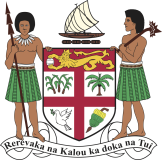Coastal Inundation Forecasting Demonstration Project Fiji (CIFDP-F) : Development of an Integrated Coastal Inundation Forecasting System in Fiji
Situación actual
The CIFDP- F is facilitating the development of efficient forecasting and warning systems for coastal inundation based on robust science and observations, along vulnerable coastal areas in Fiji. In doing so, the CIFDP-F will integrate cross-cutting scientific models into an open forecasting environment for the purpose of improving/ expanding/ developing the forecasting and warning systems for storm surges, hydrological response to heavy rainfall and Tropical Cyclone landfall on coastal areas, and other phenomena causing coastal inundation.
Beneficiary groups are mainly coastal communities in Fiji in the immediate term, through the improved performance of national institutions responsible for coastal disaster forecasting, warning, and climate adaptation planning. Every year, populations in coastal zones are impacted by coastal inundation caused by waves, including long period swell, storm surges and hydrological inundation, resulting in loss of life and damage to property. The results of this project will provide critical information to improve forecasting, warning, and evacuation planning in coastal zones.
The beneficiary sectors will include the coastal residents (end users) in agriculture, fishery, tourism and other industries, disaster managers in central and regional governments (intermediary users). In particular, improved forecasting services will serve greatly to ensure safe operation of tourism business, which is a major source of Fiji’s income.
The project is divided into phases to be implemented within the period 2016 to 2020 and a total budget of USD 1.2 million, generously provided by the Korea Meteorological Administration.
Objetivos
In order to operate and maintain a reliable forecasting system that helps the national decision-making for coastal management, the project will:
- Develop and implement an open-source coastal inundation end-to-end operational forecasting and warning system;
- Develop cross-cutting cooperation among different scientific disciplines and user communities; and
- Provide specialized training for operators / forecasters and disaster managers.
Estructura
The Fiji implementation of CIFDP is a system of systems, with three distinct components:
- Flooding caused by swell approaching Fiji from the south, coupled with high tides, can lead to serious and disruptive inundation. The forecast system developed under CIFDP runs on a desktop computer and produces rapid results. Alerts are broadcast 48 h ahead of time and warnings given with a 24 h lead time.
- Storm surges accompanying tropical cyclones are a major source of coastal flooding. CIFDP has implemented the JMA storm surge model encompassing all of the Fijian islands. This has been fully tested and performed well during TC (Sarai, December 2019), and was fully operational during TC Harold (April 2020).
- Heavy rainfall can accompany tropical cyclones and storms causing river flooding. CIFDP has developed a decision tree logic system with inputs of observed and forecasted rainfall, storm surge levels and upstream hydrological conditions, based on expert knowledge, to provide guidance to forecasters, initially for the Nadi river. This allows issuance of alerts and potential warnings of possible flooding in a complicated surge-riverine environment.
- CIFDP: WMO Coastal Inundation Forecasting Demonstration Project
- Coastal Inundation - Public Awareness for the Pacific Islands
- Coastal Inundation - Public Awareness for the Pacific Islands - voiceovers in I-taukei
- Coastal Inundation - Public Awareness for the Pacific Islands - Voiceover in Hindi language
- Región:
- Region V: South-West Pacific


- Disaster Risk Reduction







